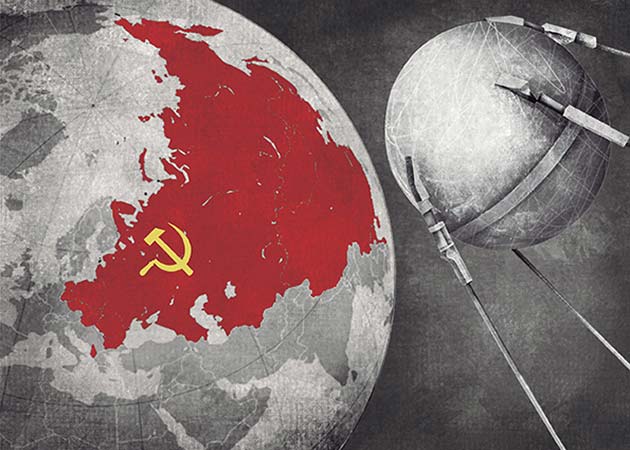By Fernando Navarro Robuschi:
Among the many breath-taking achievements of the USSR (thanks to socialist policies) I think the most important (by virtue of being directly related to life), is the achievement of "Food Security" in all the republics.
The concept of "Food security" has more than one definition, but essentially means:
"When all people, at all times, have physical and economic access to affordable, nutritious food in sufficient quantity"
"Sufficient" as in "enough to grow up/develop in a healthy way"
This was the case in the USSR. Thanks, among other things (such as centrally managing the country's resources and the use of administrative prices), to the collectivization of the countryside.
After the extremely bad harvest of 1932-1933 (which caused a famine in the Ukrainian SSR and was in turn caused not only by bad weather but also by the Kulaks killing/eating their own cattle and burning their crops in protest to the collectivization drive) famine never returned to any republic of the USSR (WW2 excepted, of course).
Historian Vladimir Shlapenkoth, clearly no pro-soviet, wrote the following regarding the Soviet diet in "A Normal Totalitarian Society":
"Compared to the 1930's and 1950's, the Soviet diet in the 1970's and 1980's was quite tolerable. Meat, sugar, and milk, which were scarce in the past, became staples for the average citizen [...] the elderly in the countryside probably suffered from the worst diet, but no one in the country went hungry or died of malnutrition" ("A Normal Totalitarian Society")
That cite alone implies that even in the worst cases the people were far from going hungry or being malnourished.
Historian Serguei Kara-Murza, who lived in the USSR, wrote regarding the Soviet diet:
"What was the food situation in the USSR? In 1983-85, a Soviet consumed 98,3 grams of protein per day, precisely the optimal norm" ("¿Qué le pasó a la Unión Soviética?")
Even the CIA concluded in its 1982 "CIA Briefing of the Soviet Economy" report that:
"The Soviet Union remains basically self sufficient with respect to food [...] At 3,300 calories [...] average daily food intake is equivalent to that in developed western countries. The grain production in the Soviet Union is more than sufficient to meet consumer demand for bread and other cereal products" (CIA Briefing of the Soviet Economy, p. 17).
Michael Parentti readily debunks the myth of the "inefficient" Soviet agriculture:
"In trying to convince the American public that the Soviet economic system is not working, the US press has pointed to the alleged "failure" of the agricultural sector. Time announced in 1982 that Soviet "farms cannot feed the people". And a year later the Washington Post reported "Soviet agriculture [is] simply not able to feed the country" [...] Writing in Parade magazine, Robert Moss designated "the collective farms" as "the prime reason for Russia's inability to feed herself". None of these assertions were accompanied by any supporting documentation [...] The reality is something else. Today the Soviets produce more than enough grain to feed their people [...] per capita meat consumption has doubled in the last two decades and exceeds such countries as Norway, Italy, Greece, Spain, Japan and Israel.
Milk production has jumped almost 60 per cent in the last twenty years so that today the USSR is by far the largest milk producing country in the world [...] These are the accomplishments of an agrarian labor force that decreased from 42 percent in 1960 to 20 percent in 1980, working in a country where over 90 percent of the land is either too arid or too frozen to be farmed" ("Inventing Reality")
Lastly, the "Economic Development, Political-Economic System, and the Physical Quality of life" study published in 1986 shows that the population of the USSR (ranked as an "upper middle-income country" in the study) had a caloric intake 37 percent above the minimum level of requirement (that is, people ate 37% more than the calorie supply needed to develop in a healthy way).
Food security was the reality for the Soviet people from 1935 (when Stalin ended rationing) to 1987 (when Gorbachov market reforms led to shortage of basic goods, among them food) with the obvious interruption of the period 1941-47 (the Great Patriotic War and the 2 years of hunger that followed because of it). That sums almost 50 years of uninterrupted food supply for everyone. And the Soviet diet was consistently getting better and better over time. This was truly one of those unparalleled achievements in human history, and it was socialism which made it possible.
Sources and further reading:
-"A Normal Totalitarian Society" by Vladimir Shlapentokh.
-"¿Qué le pasó a la Unión Soviética?" by Serguei Kara-Murza.
-"CIA Briefing of the Soviet Economy (Decemeber 1982)" by the Central Intelligence Agency (of the US).
-"Inventing Reality" by Michael Parentti.
-"Economic Development, Political-Economic System, and the Physical Quality of Life" by Shirley Cereceto and Howard Waitzkin.
-"Soviet Farming: more Success than Failure?" by Harry G. Shaffer.
